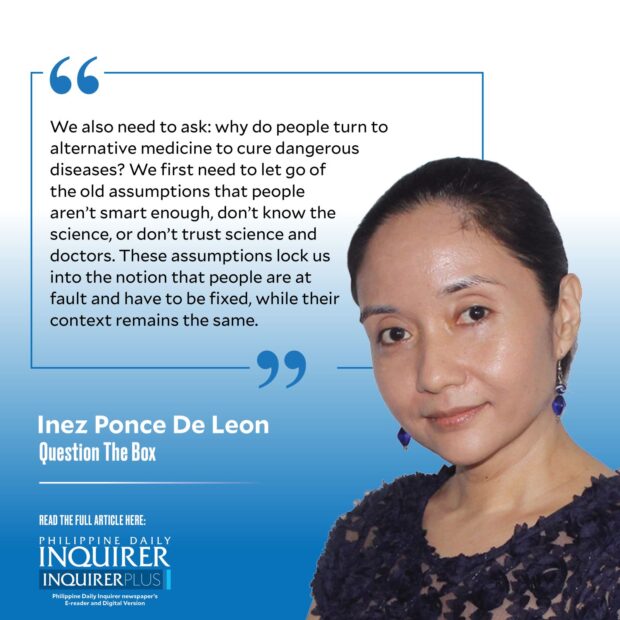The illusion of alternatives

The other day, a news article came out on how cancer patients are falling for alternative cures—a dangerous trend, as some patients rely on cure-alls and then end up exacerbating their condition.
The article mentioned the many facets of the problem: a shortage of doctors, well-equipped hospitals, and accessible health care; the fear of high medical costs; and the much-mentioned low health literacy. These, despite an act signed in 2019 that promised to provide affordable cancer services, plus newer government programs to help cancer patients.
When the problem is this complex, there, too, is a problem with framing it as “falling for” promised cures. The idea of “falling” implies that decision-making hinges on knowledge alone—and the solution would, intuitively, be a deluge of more information.
This, however, does not make sense when we look closely at the rest of the problems mentioned. The fear of high medical costs isn’t just a fear: the costs to detect, diagnose, and treat cancer, plus the post-treatment diet of fresh produce and lean meat, plus the economic cost of recuperation all run into the millions of pesos.
It would be easy to scare someone by telling them that today’s investment will prepare them for a less costly future—but what if all the money for health was lost to paying for children’s schooling, a family’s meals, utility costs, and rent?
It would also be easy to broadcast information on the importance of early detection and regular visits to the doctor—but can wageworkers set aside a whole day to wait in traffic, and then in a queue for a doctor, and then in a queue for a test, when they are paid by the hour?
Good information cannot work in an atmosphere where health care is decentralized, where out-of-pocket health care is high, where the economy cannot help fill those empty pockets.
When the problem is framed as that of gullibility, we also ignore the depth of the problem. Faulty health care, regulatory, and economic systems are not problems of information. They are problems of a supporting infrastructure.
That is: what use would knowledge of medical care have if people live in a country where they cannot get the medical care they need at a cost that does not starve them and their families?
Hype breeds hype in such an environment. Yes, there is online misinformation; but what allows it to thrive? The answer is not in the algorithm alone, nor is the sole solution better online literacy.
We also need to ask: why do people turn to alternative medicine to cure dangerous diseases?
We first need to let go of the old assumptions that people aren’t smart enough, don’t know the science, or don’t trust science and doctors. These assumptions lock us into the notion that people are at fault and have to be fixed, while their context remains the same.
There is much research on what makes people avail of some cures while ignoring others. In the Philippines, a 2022 article in Chinese Clinical Oncology by Veronica Arevalo and colleagues showed that herbal remedies have traditionally been associated with safety, even spirituality. In isolated communities, indigenous healers provide an atmosphere of trust and cultural sensitivity—whereas modern health care is inaccessible and expensive, and doctors dismiss local concerns with what is perceived as arrogance.
To simply translate more scientific information into the local language, or to even provide free services, is not enough. There are deep-seated cultural norms in play when people see health care as a luxury that despises local knowledge, and that does nothing to help people have the means to afford what comes after diagnosis.
These findings match those of research across the world. For instance, a 2006 anthropological study on North Americans’ use of dietary supplements (in the Culture, Medicine, and Psychiatry journal) found that people perceived conventional medicine as trustworthy but costly. They felt that practitioners rejected alternative medicines “out of principle, not practice.” This means that practitioners are perceived to act not out of concern for patients’ contexts and welfare, but out of upholding the tenets of Western medicine.
Again, we see strong cultural norms that cannot be overlooked. Such research tells us that the health-care system needs improvement—including training doctors themselves, who need to care about people as persons who have lives and livelihoods, not just patients who have disorders and diseases
.Such research also tells us that we are long overdue for an actual, in-depth, nonjudgmental conversation with people who have been victimized by such cure-alls, and without disregarding the personal and societal circumstances that shaped their decision.
Framing people as gullible is akin to condemning them for making the only choice they could afford. They didn’t fall. The system pushed them into desperation.
We have no right to sneer at the desperation if we don’t fix the system first.
iponcedeleon@ateneo.edu




















